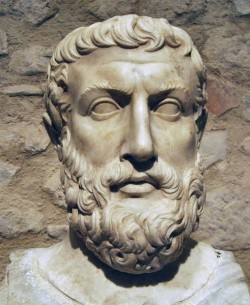Introduction | Life | Work | Books

Parmenides of Elea
(Marble bust from Velia, Italy)
|
|
Parmenides of Elea (c. 515 - 450 B.C.) was an early Pre-Socratic Greek philosopher and founder and chief representative of the Eleatic School of ancient Greek philosophy.
He is one of the most significant and influential (as well as the most difficult and obscure) of the Pre-Socratic philosophers, and he is sometimes referred to as the father of Metaphysics. He particularly influenced Plato (and, through him, the whole of Western Philosophy), who always spoke of him with veneration. Perhaps his greatest contribution to philosophy was his method of reasoned proof for assertions.
In denying the reality (or even the possibility) of change as part of his Monist philosophy, Parmenides presented a turning point in the history of Western Philosophy, and sparked a philosophical challenge that determined the course of enquiries of subsequent philosophers such as Empedocles, Anaxagoras and Democritus, and an intellectual revolution that still echoes today.
Parmenides (pronounced par-MEN-i-dees) was born in the Greek colony of Elea (southern Italy). His birth date is uncertain and the evidence of Diogenes Laėrtius and Plato is contradictory, but it is likely that he was born some time between 540 and 510 B.C., with 515 B.C. as a "best guess".
He is said to have been a student of Xenophanes of Colophon (570 - 480 B.C.), and what we know of Xenophanes' philosophy seems to be an influence on Parmenides. Diogenes Laėrtius also describes Parmenides as a disciple of the Pythagorean philosopher Aminias, although there are few Pythagorean elements in his thought.
He was the founder of the School of Elea, which also included Melissus of Samos and the young Zeno of Elea (who was about 25 years younger than Parmenides and may also have been his eromenos or adolescent lover, a common tradition of ancient Greece).
He was held in high esteem by his fellow-citizens for his excellent legislation, to which they ascribed the prosperity and wealth of the town, and it is suggested that he had written the laws of the city, which had been founded shortly before 535 B.C. He was also admired for his exemplary life (a "Parmenidean life" was proverbial among the Greeks).
Little more is known of his biography than that he stopped at Athens on a journey in his sixty-fifth year (around the middle of the 5th Century B.C.) and there became acquainted with the youthful Socrates (Socrates, Plato and Aristotle were all strongly inspired by Parmenides). His death is assumed to have taken place around 440 or 450 B.C.
Parmenides' only known work, a poem written in hexameter verse around 475 B.C. and entitled "On Nature", has only survived in fragmentary form, with approximately 150 of the original 3,000 lines of text remaining today. It is divided into two main sections, describing the two ways or two views of reality, "The Way of Truth" (which accounts for most of the surviving lines) and "The Way of Appearance/Opinion", along with an introduction. Parmenides argued in favor of the Way of Truth and against The Way of Appearance.
In the poem, Parmenides argued that the every-day perception of the reality of the physical world is mistaken, and that the reality of the world is "the One", an unchanging, ungenerated, indestructible whole. Likewise, the phenomena of movement and change are simply appearances of the real static, eternal reality. He further asserted that the truth cannot be known through sensory perception, only through pure reason ("Logos").
Parmenides set out the heart of his case in a worldview that (even by the standards of philosophy) is, according to Aristotle, "near to madness". He argued as follows: "What-is-not" does not exist. Since anything that comes into being must arise out of "what-is-not", objects cannot come into being. Likewise, they cannot pass away, because in order to do so they would have to enter the realm of "what-is-not". Since it does not exist, "what-is-not" cannot be the womb of generation, or the tomb of that which perishes. The "no-longer" and the "not-yet" are therefore variants of "what-is-not", and so the past and future do not exist either. Change, then, is impossible.
Equally, his argument continued, multiplicity is unreal, because the empty space necessary to separate one object from another would be another example of "what-is-not". And since things cannot be anything to a greater or lesser degree (which would require "what-is" to be mixed with the diluting effect of "what-is-not"), the universe must be homogeneous, a single, undifferentiated, unchanging unity. Also, it must be finite and spherical, for it cannot be in one direction any more than in another (and the sphere is the only figure of which this can be said).
Thus, by a strictly deductive argument, Parmenides asserted that change is impossible, and that coming-into-existence or ceasing-to-exist are likewise impossible, so that everything that exists is permanent, ungenerated, indestructible and unchanging. His argument refutes all accounts of the origin of the world, and represents an early type of Monism.
Parmenides therefore made the ontological argument against nothingness, essentially denying the possible existence of a void, which led Leucippus and Democritus to propose their theory of Atomism (that everything in the universe is either atoms or voids) specifically to contradict his argument.
See the additional sources and recommended reading list below, or check the philosophy books page for a full list. Whenever possible, I linked to books with my amazon affiliate code, and as an Amazon Associate I earn from qualifying purchases. Purchasing from these links helps to keep the website running, and I am grateful for your support!
|
|
